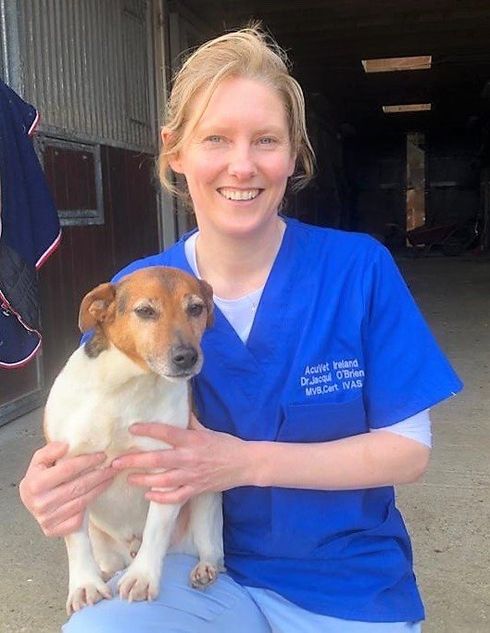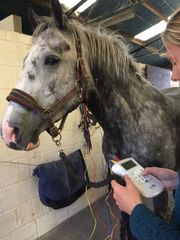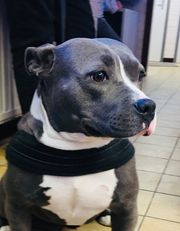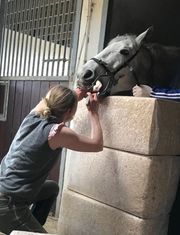
About our Vet
We love what we do and it shows.
With more than 23 years of experience in the field, our vet Dr Jacqui O'Brien MVB, Cert IVAS is highly qualified to serve your animal's needs.
'The good life is one inspired by love and guided by knowledge'
Bertrand Russell
Resume
Qualifications: -
1997, Degree; Bachelor of Veterinary Medicine (MVB), UCD, Dublin, Ireland.
2018, Certification; International Veterinary Acupuncture Society (Cert IVAS) 2 year certification course undertaken with BEVAS (Belgian Veterinary Acupuncture Society)
Veterinary Positions: -
1997-'98 - Internship at Anglesey Lodge Veterinary Hospital, Curragh, Co. Kildare
1998-'99 - Veterinary Surgeon at Peasebrook Equine Hospital, Cheltenham, Uk
2000-2016 - Veterinary Surgeon at Veterinary Clinic Ratoath, Equine and Small animal Hospital, Co. Meath
About Acupuncture
We are all made of atoms. These are tiny particles of energy. Traditional Chinese medicine belief is that this energy flows through the body via channels. These channels can become obstructed. This may occur via direct physical trauma, longstanding emotional tendency, anxiety /stress, environmental factors, improper foot balance, poor nutrition, poor air quality, seasonal changes or from something else. If these changes occur for any length of time it is even possible to see specific physical changes occurring in the animal's body. Tongue and pulse changes also occur.
Acupoints
There are circa. 361 acupoints in the body.
These points are often palpated for pain reaction.
Certain groups of points are called 'Diagnostic points'. When reactive these can indicate the origin of pain.
This is useful in lameness where diagnosis is difficult.
How does it work?
To know acupuncture is to know the nervous system. Both the nervous system and the skin derivate from the same embryonic layer (Ectodermus), so there is a clear connection between the two. Acupunctural point stimuli in the skin are captured by nerve endings and transferred to the spinal cord and the brain. Chemoreceptors in the skin are stimulated releasing biochemicals which act to cause local increase in blood flow, facilitate healing and provide local pain killing effect. Acupuncture also stimulates nerve fibres which act at the level of the spinal cord. There is an increase of serotonin and other neurotransmitters which have further analgesic effect and increase the feeling of well being and muscle relaxation.
Experience mattersExpect more
CONTACT US

Using electroacupuncture to treat this gelding who was making an inspiratory noise at exercise. On endoscopy, he had laryngeal paralysis. Response to treatment was excellent.

Electroacupuncture is used to treat hindlimb paralysis/paresis and disc disease in dogs with great results

Dental examination being undertaken by our vet Dr Jacqui O'Brien on a horse that was headshaking. Electroacupuncture is a proven treatment for ideopathic headshakers. One must, of course, first rule out any causative factors i.e. problems with the teeth, sinuses, guttural pouches, tempero-mandibular joints, cervical spine or ears.
